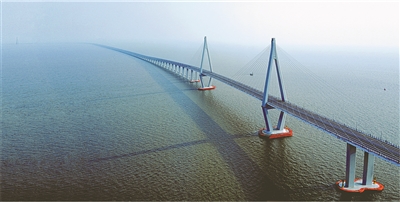Ningbo promotes integration of YRD

Ningbo, a coastal city in the southern YRD, has been an active participant in the integrated development of the Yangtze River Delta. [Photo/cnnb.com.cn]
China issued an outline of the next phase of the integrated development of the Yangtze River Delta over the next five to 15 years on Dec 1.
The YRD, which encompasses the eastern Chinese provinces of Jiangsu, Zhejiang and Anhui as well as the Shanghai Municipality, is one of the country's most dynamic regions in terms of economic development, level of openness and innovation capability.
Last year, the integrated development of the region was adopted as a national strategy.
Ningbo, a coastal city in the southern YRD, has been an active participant in the national strategy.
Qianwan New District
The city is striving to more closely integrate with Shanghai. According to a recent government plan, local authorities plan to build Qianwan New District into an investment destination for investors in Shanghai.
By the end of this year, the district aims to bring in investments worth 20 billion yuan ($2.98 bilion) from Shanghai and 100 billion yuan by 2022.
Nantong-Ningbo High Speed Railway
Construction on a high-speed railway line connecting the cities of Nantong, Suzhou, Jiaxing and Ningbo is expected to begin in 2020.
With a total of length of 338 kilometers and a speed of 350 kph, the railway will greatly enhance interconnectivity among the cities and boost the regional integrated development of the YRD.
China-Italy Ningbo Ecological Park
Established in 2015, the park's industrial output reached 13.96 billion yuan in 2018, a yearly uptick of 75.2 percent. It epitomizes the city's opening-up and increasing international industrial cooperation.
By 2022, the park aims to introduce another 80 enterprises, increasing its industrial output to 50 billion yuan.
Smart Transportation
A super highway linking Hangzhou, Shaoxing and Ningbo, equipped with intelligent transportation systems to support autonomous vehicles, is expected to break ground in May 2020.
It will be the country's first superfast highway, with the average vehicle speed of vehicles expected to increase by 20 to 30 percent.
The road will also connect Hangzhou Xiaoshan International Airport and Ningbo Zhoushan Port, China's busiest seaport, so as to boost the integration of the Hangzhou Bay area.



 Print
Print Mail
Mail
